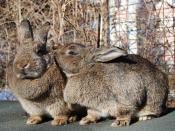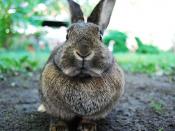SUMMATIVE HUMAN AWARENESS ESSAY
Many species introduced to Australia have ultimately changed the ecology and biodiversity in many ways. One of the species significantly contributing to this change are the feral rabbits. Rabbits were first introduced to a small area in Victoria in 1859 for sport hunting. Only twenty-four rabbits were introduced but became successful in Australia because of a lack of natural predators able to keep populations under control. Native species have been unable to adapt to the high competition and consumption of wild rabbits, causing many to become threatened and extinct. Today rabbits have been classified as pests because of their impact on native wildlife and agricultural production. They have also changed the traditional diets of the indigenous people because of their ability to breed very easily, therefore, settling in areas once thriving with native wildlife and vegetation.
Rabbits are seen to be one of the introduced predators "causing most damage to environment and agriculture".
It is estimated that "over 200 million rabbits" roam free in Australia. Feral rabbits breed faster than native species and one female can produce "between 11 and 25 young annually". These high reproduction rates allowed the rabbits to over breed and rapidly extend their habitat within merely fifty years to dominate and cover nearly 70% of Australia. This has placed enormous pressure on conservationists struggling to protect endangered flora and fauna. Controlling feral rabbits is also seen as vital to reducing feral cat and fox populations, also threatening many native species.
Wild rabbits dominated the Australian region very rapidly soon
after release.
Wild rabbits have established themselves as a growing commercial industry in Australia, with over 3 million hunted by professional shooters annually for local and overseas exports. Wild rabbits are prized for human and animal consumption because...


